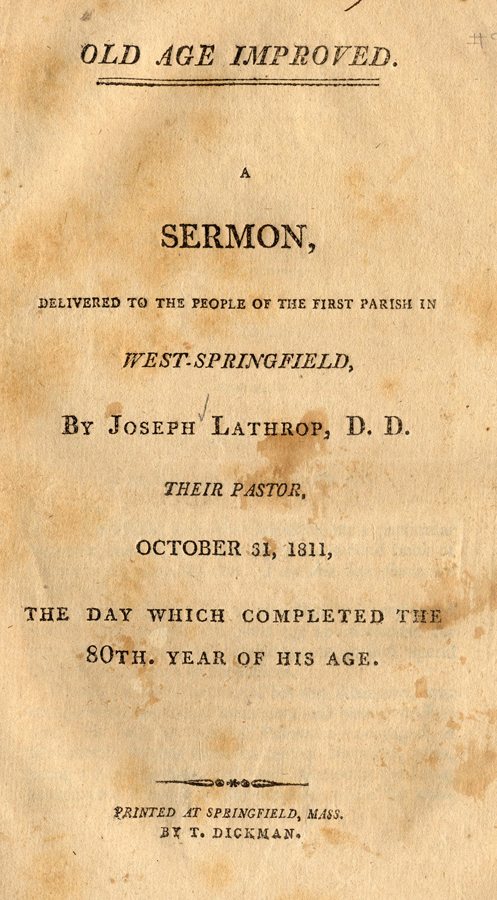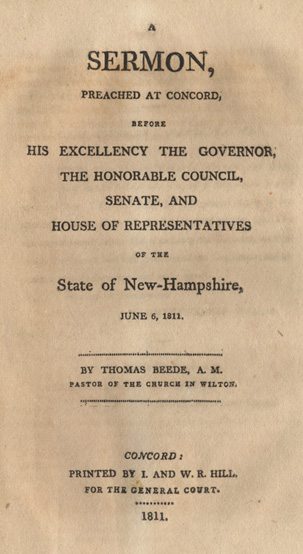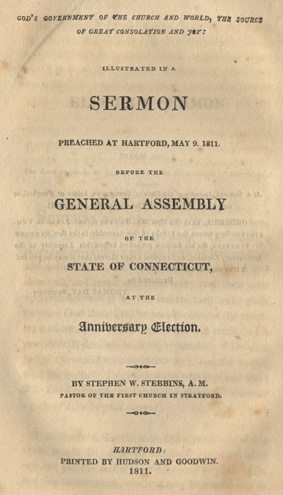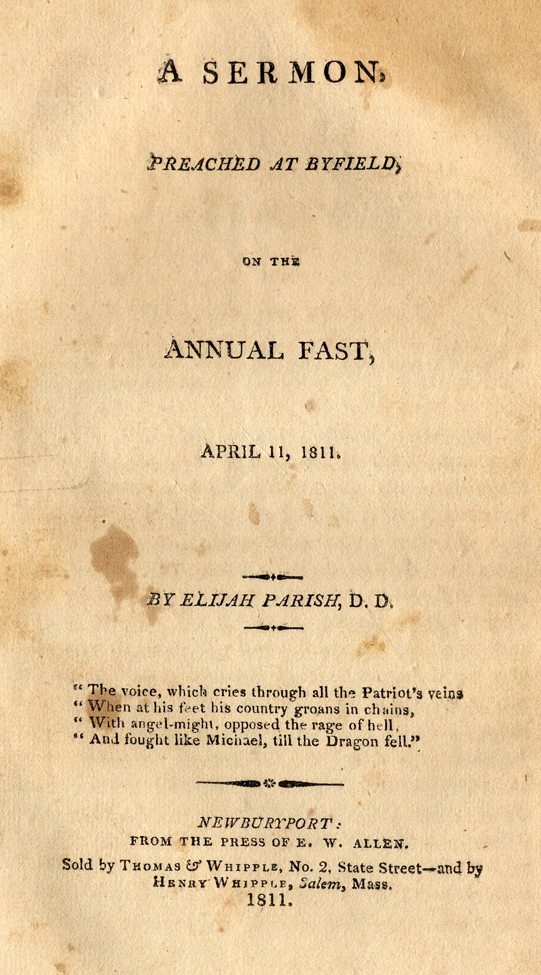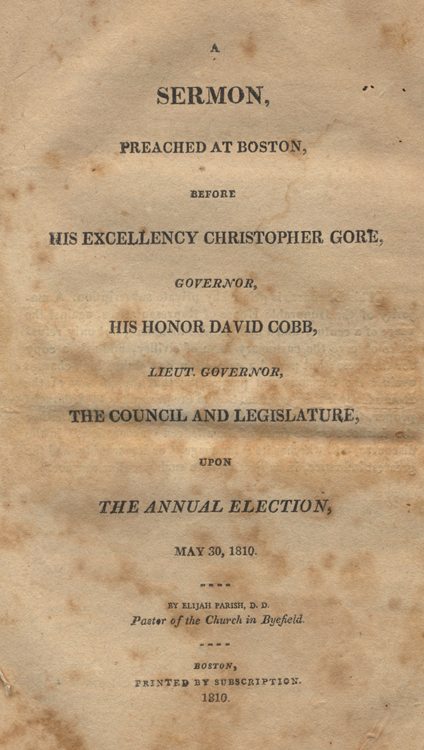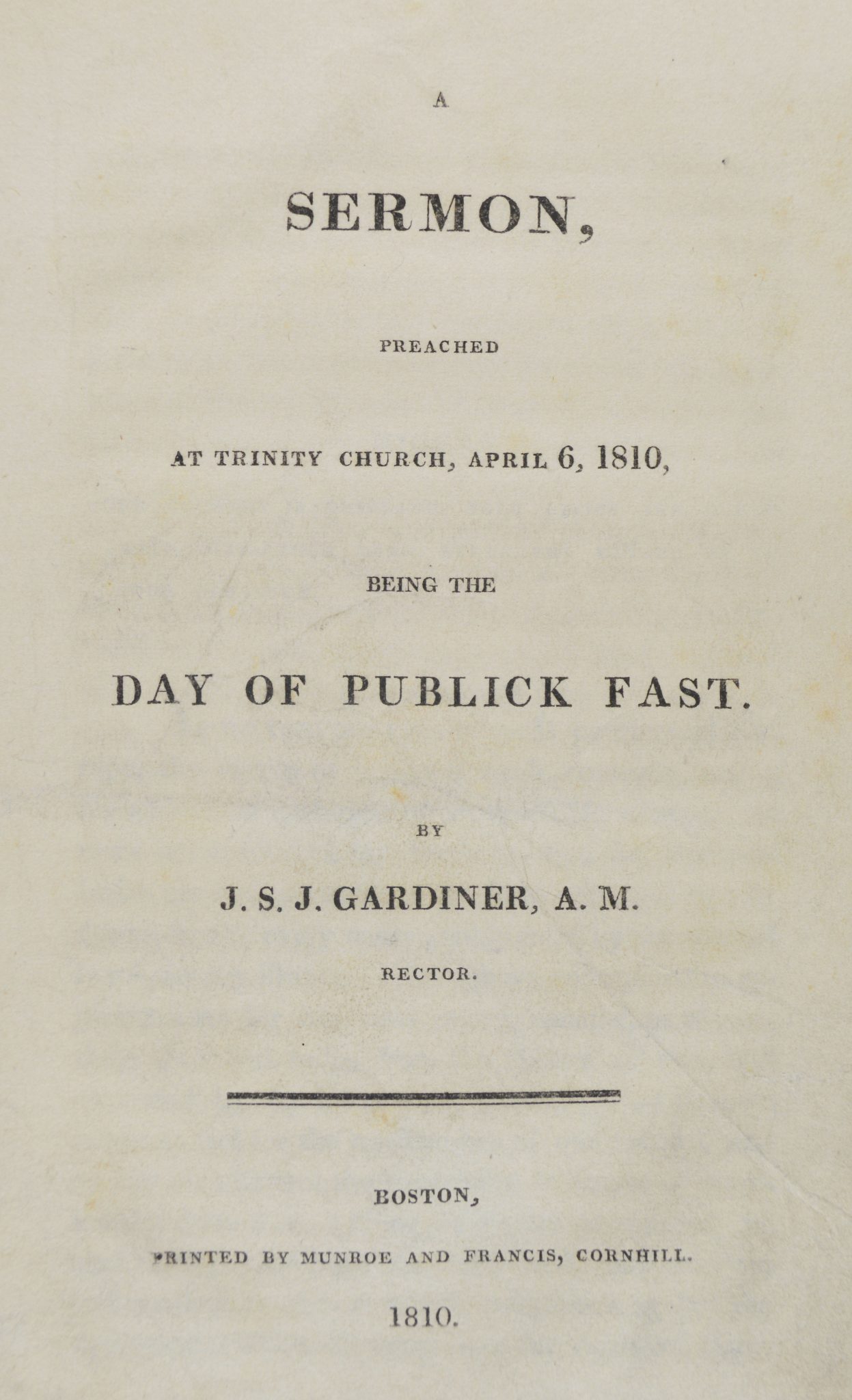John Elliott (1768-1824) graduated from Yale in 1786. He was pastor of the Madison, CT Congregational Church (1791-1824) and a fellow of Yale (1812-1824). The following sermon was preached by Elliott on May 10, 1810.
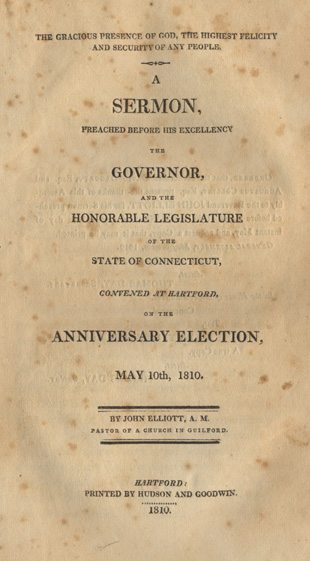
THE GRACIOUS PRESENCE OF GOD, THE HIGHEST FELICITY
AND SECURITY OF ANY PEOPLE.A
SERMON,
PREACHED BEFORE HIS EXCELLENCY
THE
GOVERNOR,
AND THE
HONORABLE LEGISLATURE
OF THE
STATE OF CONNECTICUT,
CONVENED AT HARTFORD,
ON THE
ANNIVERSARY ELECTION,
MAY 10TH, 1810.
BY JOHN ELLIOTT, A. M.
PASTOR OF A CHURCH IN GUILFORD.
Ordered, that the Honorable David Daggett, Esq. and Augustus Collins, Esq. present the thanks of this Assembly to the Reverend JOHN ELLIOTT, for his Sermon preached before them, at the annual Election, on the 10th day of instant May, and request a Copy, that it may be printed.
General Assembly, May Session, 1810.
Passed in the Upper House.
Attest,
THOMAS DAY, Secretary.
In the House of Representatives.
Concurred,
Test,
W. T. WILLIAMS, Clerk.
A true Copy,
Attest,
THOMAS DAY, Sec’ry.
ELECTION SERMON.PSALM XLVI. 1, 2, 3, 4, 5.
God is our refuge and strength, a very present help in trouble:
Therefore will not we fear, though the earth be removed and though the mountains be carried into the midst of the sea;
Though the waters thereof roar and be troubled, though the mountains shake with the swelling thereof.
There is a river, the streams whereof shall make glad the city of God; the holy place of the tabernacles of the most High.
God is in the midst of her; she shall not be moved: God shall help her, and that right early.
The divine government is justly matter of universal joy. By the perfections of Jehovah we are taught, that it must be infinitely just, holy and good. From no other source can the good man derive consolation equally rich, support equally firm. Human things are mutable, worldly good uncertain. Honors fade. Riches flee. Pleasures satiate. Bright prospects darken. The best founded expectations are often disappointed.—In this fluctuating state of things, the contemplative mind anxiously looks around for some permanent object on which to rest. Revelation utters her sweet and consoling voice; she points to the throne of God: she exhibits to view that dominion which is everlasting, that kingdom which will never end. With this exhibition she confirms the wavering, refreshes the weary, strengthens the weak, consoles the distressed, and animates the desponding.
The passage before us is the language of holy confidence in the government, protection and goodness of God. Of this confidence, the devout Psalmist gives many striking specimens in his writings, both in scenes of adversity and in days of prosperity.—This Psalm was probably composed on the occasion of the success, settlement and peace given by the Most High to the people of Israel, after the numerous wars in which they had been engaged, previous to the reign of David, and in the first part of his reign. The divine protection and mercy, so often experienced by him and the nation over which the Lord had exalted him to be king, had inspired them with unshaken reliance upon his almighty power and infinite goodness. In the day of trouble he had been their deliverer, in the season of darkness had given them light, and in the time of danger had filled them with hope and with courage. Undismayed, trusting in the divine arm for salvation, they were ready to encounter difficulties the most trying, to meet dangers the most pressing, and to contend with foes the most powerful.
In prophetic language, great confusions, desolations, and calamities among nations, are described by the moving of the earth, the upheaving of the mountains, and the roaring of the waves of the sea. Thus saith the Lord by his holy prophet, I will shake the Heavens and the earth, and the sea, and the dry land, and I will shake all nations, and the desire of all nations shall come: 1 a passage universally believed to refer to the great commotions, confusion and revolutions, which immediately preceded our Saviour’s advent. In like manner, in this Psalm, by the moving of the earth, the shaking of the mountains, and the roaring of the sea, we are to understand the wars, which the neighbouring nations waged against the people of God, and the immense armies which came against them.
In the following verse the Psalmist uses the metaphors of a river and streams. By the river and streams is represented the gracious presence and blessing of the Lord. Spiritual blessings are many times described under the metaphor of waters: Thus it is declared by the prophet, Living waters shall go out from Jerusalem. 2 In Ezekiel’s vision, waters are represented as issuing out from under the threshold of the Lord’s House, and increasing to a deep river, emblematical of the divine spirit in his holy influence, and the gracious presence of God. Agreeably to this figure it is said, I will pour water upon him that is thirsty and floods upon the dry ground: I will pour my spirit upon thy seed, and my blessing upon thine offspring. 3—A stream of spiritual blessings will make glad the city of God. This city is Zion; the holy place of the tabernacles of the Most High. God is in the midst of her. Here he appears in the glory of his protection, of his mighty power and exceedingly rich grace. She shall not be moved. Jehovah is to his people, by his gracious presence, a place of broad rivers and streams. 4 They dwell on high, their place of defence is the munitions of rocks.
From this view of the passage will arise this general doctrine, that the gracious presence of God is the highest felicity and security of any people.
In the illustration of the subject, it will be proper to shew in what respects God may be considered as graciously present with a people, and then contemplate their felicity and security.
God is graciously present with a people,
I. In giving them godly CIVIL RULERS.
By the operation of second causes men are exalted to rule over a people. They may be raised by real worth, and the wise and unanimous choice of their fellow citizens, to guide the affairs of the state. Without seeking to obtain them, they may rise to dignified stations, and enter with diffidence upon the discharge of their public functions.—They who reflect neither deeply nor religiously may view these, as events in the ordinary course of things, and resulting merely from human policy. The primary cause may lie hidden from their sight.—But he who makes the Bible his resort, and depends on this for light, will be led to the rational conclusion, that an invisible hand operates in these high concerns, with well directed and successful force: that the elevation of rulers is one branch of that divine Government, which controls every event, great and small.—In extraordinary cases, in which, contrary to all human expectation, men rise to distinguished stations, these principles are readily admitted. In revolutions highly conducive to the liberties and happiness of mankind, if an individual appear with shining and commanding talents, acquire an ascendency in the hearts of his countrymen, and by his valor, his wisdom and maxims of sound policy, lead them to peace, to happiness and glory, the divine hand is gratefully acknowledged. The agency of Heaven is allowed to be written clearly, as with the beams of the sun. To extend it to all cases, when things proceed in their usual and regular course, is, in the minds of some, attended with more difficulty. But let it be considered, that as on the one hand, weak and wicked rulers are a rod, a scourge in the hand of God, to execute his wrath and to punish a refractory people, so on the other, those who are wise and virtuous, are his appointed mean of conveying innumerable and immense blessings to the obedient. That they are thus to be viewed, we are abundantly taught in the volume of inspiration. By me kings reign, and princes decree justice. By me princes rule, and nobles, even all the judges of the earth. 5 Saith the Lord concerning the proud King of Assyria, O Assyrian, the rod of mine anger, and the staff in their hand is mine indignation. I will send him against an hypocritical nation, and against the people of my wrath will I give him a charge to take the spoil, and to take the prey, and to tread them down like the mire of the streets. Howbeit, he meaneth not so, neither doth his heart think so. 6 Of an illustrious prince, divinely called to be an eminent blessing and deliverer to God’s chosen people, it is written, Thus saith the Lord to his anointed; to Cyrus, whose right hand I have holden, to subdue nations before him; and I will loose the loins of kings, to open before him; and I will loose the loins of kings, to open before him the two-leaved gates, and the gates shall not be shut: I will go before thee, and make the crooked places straight; I will break in pieces the gates of brass, and cut in sunder the bars of iron:–For Jacob my servant’s sake, and Israel mine elect, I have even called thee by thy name; I have surnamed thee, though thou hast not known me. 7 Cyrus was the chosen instrument, to capture the city Babylon and set at liberty the house of Israel, at the end of the captivity of seventy years.
That wisdom and virtue, which are the essential qualifications of good Rulers, are derived immediately from the fountain of all wisdom and all virtue. Jehovah himself implants in the heart those divine principles, and diffuses in the understanding that light, which constitute a wise, and great, and good ruler. He gives those dispositions, as well as talents, which adorn exalted stations, and without which we have no reasonable ground to believe that men will rule with honor to themselves, or real benefit to a land. Holy fear and Christian benevolence are inspired by him, and the exercise of these might be shewn, both from reason and scripture, greatly to contribute to the usefulness of magistrates, princes and all in authority. By emblems which convey striking ideas of beauty and joy, are rulers of this character described in the divine word. The God of Israel said, the rock of Israel spake to me, he that ruleth over men must be just, ruling in the fear of God. And he shall be as the light of the morning when the sun riseth, even a morning without clouds: as the tender grass springing out of the earth by clear shining after rain. 8—As God hath in his hands the hearts of all the children of men, both of those who exalt and of those who are exalted to office, and turneth them as the rivers of water are turned, good and faithful rulers are his legacy bequeathed to a people. The elevation of David to the throne of Israel is a very pertinent example of the kind interposition of the Most High, to bless his people in the person of their King. He chose David his servant, and took him from the sheepfolds. From following the flock, he brought him to feed Jacob his people and Israel his inheritance. 9 Great, wise and magnanimous, he adorned the throne to which the special hand of Heaven had exalted him; was blessed to triumph over the enemies of God’s chosen people, to hold the scepter with honor and dignity to a good old age, and to leave the kingdom in the zenith of prosperity.—David was a man after God’s own heart, greatly renowned as a prince, and eminently pious; and when drawing toward the close of life, gave a most solemn charge to Solomon his son and successor, to keep the commandments and obey the will of God.—Not only was he exceedingly zealous to do good to the kingdom, but to the church, and while he assiduously labored to promote the peace, and order, and welfare, of the one, he was supremely concerned for the prosperity of the other. In the days of peace and wealth in the nation, he contemplated the erecting of a splendid temple for the solemnities of public worship, but by divine direction, this heaven-approved plan was not executed until the reign of Solomon. When a nation is blessed with rulers who, like David, lead them to high political happiness, in the pursuit of measures wisely calculated for this end, this rich blessing is to be acknowledged as coming from the divine hand. When the political interests of a people are committed to the guidance of pious and faithful rulers, it is frequently the fact, that Zion is favored by Heaven with a precious season of rest and prosperity.
II. By a sound, faithful and evangelical ministry. The richness and source of this blessing may be thus contemplated.
The Gospel contains and inculcates the purest system of morals ever devised.
In its foundation, extent and motives, it transcends, far transcends, the boasted systems of the most enlightened heathens. Its foundation is the moral excellence of the divine nature and character; its extent, the hidden man of the heart, every thought, emotion and exercise, as well as the outward conduct, and at all times, under all circumstances, and with respect to all subjects; and its motives, the commands of the supreme being, the glory of a resemblance to him, and the hope of escaping his eternal wrath and securing his everlasting favor.
In its duties, it enjoins whatever is proper, necessary and dignifying to man in every station; whatever is proper in natural, moral, political or social ties; whatever is necessary for the mutual assistance and felicity of men, or whatever exalts and adorns human nature. Its injunctions, reverenced and obeyed, are eminently calculated to qualify men for usefulness and promote their happiness in this world, and to prepare them for endless glory in the world to come. This divine system allows not the least degree of impurity in thought or deed; of injustice, falsehood, uncleanness, intemperance, or whatever can defile the soul or body. The practice of every virtue, personal, social and moral, is positively enjoined; the practice of vice, in every form and degree, is peremptorily forbidden. Let the plan of Christian morals be examined with the utmost diligence and scrutinized with the greatest care, and the more decided will be the conclusion, that it is superior to every other; that it is complete without the least defect. The more minutely this point is discussed, the more extensive the induction of particulars, the more deep and impressive will be this conviction.
The most effectual method to diffuse the knowledge of this exalted system, and induce men to observe it, is the institution of the Gospel ministry.
This is the mean appointed by infinite wisdom and goodness. It is not merely an human device, the project of interested churchmen and skillful politicians. The holy Sabbath, with its merciful and comforting institutions, derived its origin from Heaven, and is a part of the benevolent plan of the Most High, to reclaim and save a ruined world. The body of mankind, from the little leisure they enjoy, from their natural blindness on moral subjects, the reluctance with which they study them, and a multitude of other causes, although the pages of inspiration were spread before them, would still remain, without a preached Gospel, in great ignorance on subjects of infinite moment.
By the labors of an order of men specially appointed by God to search the sacred scriptures, to study the maxims, principles and motives of the Gospel, and to communicate the knowledge they treasure up to their fellow men, at stated times and in a solemn manner, more light is diffused, than would, otherwise, ever be enjoyed.
It is infinitely proper, as the ministry of the word is divinely appointed, that the qualifications and duties of those who engage in it, should be clearly prescribed and defined. This we find to be fact. Preeminent among these qualifications is soundness in the faith, and among these duties, faithfulness to souls. It is truth in opposition to error, it is the real Gospel in opposition to heresies, which they are commanded to preach. Truth enlightens; error darkens. The real Gospel exalts both the Father and the Son; heresies dishonor them. Revealed truths, not the fictions of men, are accompanied with divine power. Men may philosophize. Their speculations may be refined and ingenious. But the light they diffuse is like that of the sun upon the bleak regions of the polar circle. They leave the heart cold and unaffected.
The more intelligent beings are enlightened in the nature of moral excellence, in its perfection in Deity, and its glory in the creature; in the character of him by whom all things were made, and of their own destination; in the wonders displayed in the plan of redemption, and the infinite importance of the concerns of the soul; the more elevated are their views, the more are they attracted with the beauty of the divine character, the more deeply do they feel the necessity of divine favor. Since, then, the Gospel unfolds these things, inculcates these principles, and urges the study of these sublime truths, and since those to whom is committed the ministry of reconciliation, are specially called to preach the Gospel, it is highly important that their efforts be rightly directed. If they fall short of the mark in the instructions which they give; if they conceal or pervert the truth, they do not pursue the method most probable to promote the glory of God, to enlarge the capacities of moral beings, and impress on their minds a just sense and influential belief of revealed doctrines, and thus to prepare them, by holiness and love, for a kingdom and endless glories in the invisible world.
To no class of men does Divine Providence present opportunities, so favorable to enlighten the understandings, and affect the hearts of their fellowmen with truths unutterably solemn and interesting, as to those who serve at the altar. Their instructions and admonitions, if faithful to their master and to precious souls, are eminently calculated, and frequently are blessed by God, to lead mankind in the path to eternal glory; to excite in them supreme love to the great author of their being; to render them holy in heart, heavenly in their desires, devout in their frame of spirit and godly in their lives; to impress them with a sense of the worth of the soul, the solemnities of the day of judgment, the retributions of eternity, and the inseparable connection between a life of holiness and a crown of glory, a course of sin and the world of despair. As blessings so immense, to beings destined to immortality, result from sound and faithful instruction in the things of Christ’s kingdom, and as from that of an opposite character there is no reasonable ground to hope that they can be derived, the importance of a faithful ministry is obvious.
Preach the preaching that I bid thee, is the command of God to the prophet Jonah: and to Ezekiel he saith, Thou shalt speak my words unto them. Christ charged his ministers to preach the Gospel received from him. None but this, are they authorized to preach; none but this, will be profitable, if preached. The word of God is quick, and powerful, and sharper than any two-edged sword, piercing even to the dividing asunder of soul and spirit, and of the joints and marrow, and is a discerner of the thoughts and intents of the heart. 10
The qualifications and usefulness of those who serve at the altar are from God. He allots the circumstances of birth, of education, and of every step preparatory to an entrance into the vineyard; and he bestows his grace, that they may enter upon the work with pleasure, with his approbation, and with a fair prospect of usefulness. Not only, those who are specially called, like Paul, and commissioned as ambassadors of the prince of peace, but all who in the ordinary course of things, in the present state of the Church, are inducted, according to the divine will, into the evangelical work, are supremely indebted to God. When they preach the unsearchable riches of Christ, and beseech sinners to become reconciled to God, divine power alone accompanying the word renders it effectual. This alone carries divine truths to the heart, impresses them with irresistible energy, and brings forth happy fruits in the life and conversation. Talents the most splendid, labors the most indefatigable, instruction the most faithful, and exhortations the most pungent, will not insure the conversion of a single soul. Neither he that planteth is anything, neither he that watereth, ut God that giveth the increase. 11 Means and subordinate agents are of no account, in comparison with the great and efficient cause of all saving effects. The warm influences of the sun, and the showers of rain, are important means of producing the fruits of the earth; but would doubtless prove insufficient without the secret, mysterious influence of immediate divine power and wisdom, to put in motion the various particles, and form them into the innumerable shapes and different natures, in which they appear. The same is the case in spiritual things, Paul planteth, Apollos watereth, but God giveth the increase. If a minister preach the truth with apostolic purity and zeal for a longer or shorter period, he does no more towards converting and sanctifying sinners, than the husbandman does toward bringing showers from Heaven, and actually making his grass and grain grow, when he plows, plants and manures. The effect of means on the hearts of men is represented as a work to which God only is adequate. It is bringing those who are spiritually dead, to life. You hath he quickened, who were dead in trespasses and sins. 12 Christians are said to be created in Christ Jesus unto good works: and, If any man be in Christ he is a new creature. To bring to life those who are dead, and to create anew, are certainly the work of God. They are things which the use of means alone can never effect.
As the Most High hath revealed a perfect system of morals; as he hath established the most effectual method to spread the knowledge and the love of it, and blesses his own means for this salutary and important end, a people favored with divine messengers, sound in doctrine and unwearied in labors, have reason to beliee, that God is graciously present with them.
III. By revivals of religion. It is here taken for granted, that religious revivals spring from divine influence; that they arise from the display of almighty power; that they are the appropriate and glorious work of the Holy Spirit.
At such seasons of refreshing from the presence of the Lord, there is an immediate change in the moral state of the community. This was the case with the Jewish nation in the days of Hezekiah, Ezra and Nehemiah. The Church, by their instrumentality, their activity and zeal, was purged from great corruption. Jehovah came down with mighty power, and crowned their efforts with his blessing. And thus hath it been in every revival from that day to this. Y the outpouring of the Divine Spirit, the Church is beautified and enlarged. Her appearance is that of a well watered garden. Saints are edified and roused to exertions, and sinners are alarmed, smitten and quickened. The change in the aspect of a Church or people is exceedingly joyful, and extensive in proportion to the divine influence experienced, to the numbers called out of darkness into marvelous light. Every new-born soul is an addition to the family of God, and made better in the state of his heart. He increases the number of the children of righteousness, faith and love. Old things are done away and all things become new. Experience abundantly testifies, that when a religious solemnity pervades a people, higher objects engage their attention, eternal realities engross their thoughts. They raise their views from earth to Heaven, and carry them forward from time to eternity. From the light introduced into their understandings, and from their impressive conceptions of invisible things, the wicked become astonished at their folly, and alarmed at their danger. They shudder at the remembrance of their iniquities and the apprehension of approaching wrath. With the unquenchable burnings of Tophet in full view, with consciences awakened from carnal security, they pause in the road to ruin, and feel the urgent necessity of flying from the wrath to come. With the keeper of the prison they exclaim, What must we do to be saved? Savingly wrought upon, the once natural man abandons every false way. He turns with abhorrence from the course of iniquity, which dishonors God and leads to endless misery. He pursues the path of holiness and new obedience, and strives to please, and delights to obey his Maker. From the hatred, he turns to the love, of God. In the train of the followers of the Lamb are sometimes seen those, who have greatly surpassed others in the number and enormity of their crimes. Every individual thus changed produces an effect, greater or less, upon the morality of a community. Religion pure, and undefiled, before God and the Father; genuine repentance, supreme love and filial fear, with all their happy fruits, are made to abound. Not only are these fruits found on the trees of righteousness, the planting of the Lord now introduced into his garden, but they greatly increase on those, which have stood long under divine cultivation. At such seasons, saints receive fresh anointings. Their example, already bright, shines with brighter lustre. Their prayers are more fervent, and their holiness and love for souls more apparent.—Those who preach the word, not unusually, receive from their divine Master, in such solemn and interesting periods, emphatically, a double portion of the Holy Ghost, and are made more than ever, willing to spend and be spent, that they may win souls to Christ.—Strengthened by the mighty God of Jacob, and animated by the glorious prospect of success in their work, they redouble their efforts, and become instant in season and out of season. They count not their lives dear unto themselves, that they may finish their course with joy, and the ministry which they have received of the Lord Jesus, to testify the Gospel of the grace of God. 13
Again. The outpouring of God’s Spirit, in revivals of religion, lays a foundation for the long continuance of Christian graces and virtues in a community.
Although it be a common remark, that a period of dullness and insensibility usually succeeds one of special enquiry, great light and abounding joy, still it is not to be doubted, that every Church, refreshed with dews from heaven, will, in consequence of them, enjoy life and beauty for a length of time. The concurrent testimony of writers, with respect to revivals of religion, establishes the fact that the greatest proportion of those called into the kingdom of Christ, are in the early periods of life. Of course, calculating on the common principles of human life, the probability that they will shine as lights in the world for a long time is greater, than if they were gathered in, when their sun was ready to go down. Young Christians, if they grow in grace and knowledge, will be brighter in old age, than if made subjects of grace in declining years. Their example and their admonitions will a longer time stand in the view of their fellowmen, and from the reverence paid to years, will, probably, be more impressive, while the benefit of their prayers will the longer be enjoyed, by the Church and the world.
When parents are made pious, prayerful, holy and exemplary, the effects on their families are great and happy. They devote their children to God and train them up for him. They pray earnestly for them that they may be sanctified, made useful in life, happy in death, and prepared for glory. They instruct them in the doctrines and duties of religion, they give them salutary counsel, and to all this, they add the efficacy of a Christian example. These prayers are often heard, and these means used for their eternal welfare, blessed y Heaven. The little ones are called to Christ. They rise up a generation in the fear of the Lord. In their day they spread the savor of Jesus’ name to their families around them, and in process of time, they to theirs, and from generation to generation. None can tell the end of the blessings to flow from the conversion of a single sinner, especially the head of a family.
The immense blessings of the effusion of the holy spirit on public seminaries may be gratefully traced. For Colleges and other similar institutions founded for religious purposes, the prayers of pious ministers and people have ascended from time to time. To these the aged minister turns his eye in search of a successor: to these the Churches look for future Pastors. These are in a peculiar sense a River, the streams whereof make glad the city of God; the holy place of the tabernacles of the Most High. Revivals in them furnish laborers for the vineyard. The sacred desk is filled with able, pious, evangelical ministers. From the schools of the prophets youth go forth, enriched with grace, champions of truth, zealous for the glory of God. They do, faithfully, the work of Evangelists; they teach mankind the way of salvation, they ably plead the cause of the Redeemer, and are made instruments of bringing many sons and daughters to glory. In this way pure doctrines are maintained and inculcated, evangelical principles are impressed and embraced, souls are made to flock to Christ as a cloud, and as the doves to their windows, heaven is peopled from the earth, and cherubic and seraphic hosts sing for joy.—Every pious youth who thus engages in the work of the Lord, by diligent attention to the state of the schools in the field of his labors, and the instruction of those designed for a public education, may also be a mean of conveying unspeakable good to mankind, to the Church, and to immortal souls.
Nor is the influence of vital religion springing up in public seminaries, confined merely to the circle and activity of those who serve at the altar. Here are educated those who adorn the senate, who preside with dignity in tribunals of justice, and who fill the various departments of civil life. Elevated to exalted stations, those who love Zion, and feel deeply interested in her prosperity, as is the case with all who possess vital piety, spread the savor of Christ’s name through the community, and by their shining example commend to others that holy religion, the advancement of which they constantly seek. From this fountain flow the multiplied streams, which enrich and refresh neighbourhoods, societies, towns and states. Pollute this fountain, and corrupt streams will issue. Pestilential vapors will arise, and poisonous contagion overspread the land. If this light be darkness, how great is the darkness?
IV. God is graciously present with a people by a missionary spirit. By this we understand a willingness in the hearts of men to do whatever is requisite for the promulgation of divine truth, where it is not known, or is not statedly dispensed. The field of missionary labors is varied by circumstances. According to the aspects of divine Providence, the efforts made in this cause are to be directed. Sometimes the Heathen are to be evangelized, and taught the first principles of revealed religion; at others, those who have been born in a gospel land, but have removed where the stated ministry is not enjoyed, are to be instructed in doctrines partially known and believed, and exhorted to receive the truths of the cross in love, and hold fast the profession of faith without wavering.
A devotedness of talents suited to the work, and a liberality of heart to furnish everything necessary to meet the expenses arising in its execution, are required in this plan. When both appear in readiness for the object; as the preparation of the heart is from God, as instruments for any design to be accomplished must be provided by him, as this work tends immediately to his glory by bringing souls to the knowledge of his moral character, and to a saving union with the Redeemer, as success in the work spreads the knowledge and savor of Immanuel’s name, it is clear that they are provided directly by the Most High. The existence of this spirit—of an anxious desire, that unenlightened nations should be brought to the knowledge of the Saviour, or that others less favoured than the body of a Christian nation, should be assisted in their spiritual concerns, is a token for good; an evidence that a kind and merciful God hath inspired with feelings, views and exertions to promote his own cause, and affords a ground of hope, that he will meet them with a blessing.
The establishment of missionary societies systematizes, and renders more effectual, the efforts of those, who are possessed of an evangelical spirit and friendly to the object they have in view; and the sending of missions wherever there is a prospect of usefulness, has a most direct tendency to magnify Jehovah’s name, and make it glorious in the earth. Zion is by these means enlarged and blessed, heavenly light is made to shine upon dark and benighted lands, songs of praise are put into the mouths of new-born souls, and nations who had long groped in darkness are brought to behold the brightness of the Sun of righteousness.—This is, in all probability, the method, which divine providence is improving and will bless, to prepare the world for the glorious and universal reign of the Prince of Peace; an event which enraptures, in contemplation, the souls of the godly, and to which the militant church, in every age, lifts up her eye with transports of joy.
V. By a spirit of love, unity and peace. This is the very principle which lies at the foundation of the Gospel, which is expressly inculcated in the divine word, and is enforced by the example of our Lord from Heaven. Benevolence is the great law of Christianity. By all who know the power of religion, it is sacredly obeyed. They behold in this law a transcript of their Master’s will. They see in it a proof of his tenderness and love. Let all bitterness, and wrath, and anger, and clamour, and evil speaking, be put away from you, with all malice: and be ye kind one to another, tenderhearted, forgiving one another, even as God for Christ’s sake hath forgiven you, 14 is the exhortation of an inspired Apostle. By this shall all men know, saith the Redeemer, that ye are my disciples, if ye have love one to another. 15 Love is the fulfilling of the Law.—But from the imperfection of sanctification, the truth is, that even among Christians, this law is not universally and faithfully observed. The remains of indwelling corruption gender a degree of malice, pride, revenge, or some unruly passion, even in the best of men. No wonder, then, that in the world at large, where so many causes of contention exist, where the effusions of the natural heart reign without control, and where selfishness is acted out with so little restraint, jarring passions disturb the peace and impair the happiness of men. The circle of these may be wider or narrower, according to the force of the principle called into action. Families, neighborhoods, societies or states may be shaken by them. The miseries they produce can hardly be conceived, and can be but faintly described. So perpetual is this jarring of the passions, and so wretched its effects, that when a principle of friendship, kindness and love is introduced and reigns in a community; when the promotion of the general good and felicity is the study and ambition of all, or of the greatest part, it may justly be said, that God is graciously present with that people. They experience how good and how pleasant it is, for brethren to dwell together in unity. They live like brethren of one great family. They are actuated by principles more pure and sublime, than usually prevail with mankind, clearly indicating an influence not springing from the carnal, unsanctified heart. The object in view with men thus influenced, is worthy to be pursued, the advancement of the good of the whole: an object, in seeking which they may confidently hope for the divine smiles. Selfishness, pride and carnality are the abhorrence of good men and of our Maker. Such may be considered the tokens of the gracious presence of God in a land. The felicity and security of a people thus highly favored, richly deserve contemplation.
The description of a community where God is thus present, spreads over the mind lively images of whatever is beautiful and happy. Godly rulers contribute greatly to public felicity. The Church of Christ is in a peculiar manner the object of their love and their care. To her they are nursing fathers and mothers. By them the rights of conscience are sacredly respected and guarded. By their influence colleges are founded, endowed and cherished. Inferior schools receive their patronage, and provision is wisely made for the education of those in the most humble walks of life, in such measure, and by such methods, as to train them to usefulness, and to virtue. They feel devoted to the welfare and prosperity of their country, and that in the advancement of these, the temple of liberty must be kept free from pollution. They will see that laws securing the rights and privileges of the people, are not only enacted, but faithfully executed. Tribunals of justice will be filled with those who will shake their hands from holding bribes, and their independence will be established in the best manner against the overbearing influence of power, should it ever be exerted to produce a perversion of judgment. While the righteous bear rule it will not be said, Judgment is turned away backward, and justice standeth afar off: for truth is fallen in the street, and equity cannot enter. 16 The happy state of things described by the prophet will be realized, I will make thy officers peace, and thine exactors righteousness. Violence shall no more be heard in thy land, wasting nor destruction within thy borders: but thou shalt call thy walls salvation, and thy gates praise. 17 Freedom is here enjoyed to as great an extent as is consistent with its own existence. Its genial influence is felt, like the solar rays, by the inhabitant of the humblest cottage.
Not only are all the important national concerns of such a land wisely managed, but the interests of Christ’s Kingdom are divinely prospered.—The ambassadors of the Prince of Peace faithfully teach the doctrines of the cross, and Jehovah comes down with the out-pouring of the Holy Ghost, to crown their efforts with success. A spirit of religious enterprise is roused, to spread the knowledge of the Redeemer to remote quarters of the globe, and gather subjects into his holy and spiritual kingdom. Interesting measures are devised to improve the liberality of the affluent; glorious objects are presented to animate the prayers of the pious. Immortal souls are sanctified in vast numbers, and pilgrims are seen in multitudes on the road to the New Jerusalem. This state of Zion affords to her friends the most solid grounds of joy, because the greatest accessions are made from the militant, to the triumphant Church.—The face of community resembles the surface of the ocean in a summer’s day. No wind ruffles. No wave rolls. All is tranquil and serene. What is wanting in the view of the profound statesman, the sound moralist, or the pious Christian, to render this community as happy as any on earth can be? Here is found the most rational liberty, the purest virtue, the brightest prospect for immortal beings.
Contrast this state of things with its opposite. Compare this community with one, from which God withdraws his gracious presence.—The Rulers are neither fearers of God, nor haters of covetousness. Their object is not the good of the nation, but personal aggrandizement. No discussions concerning the welfare of Zion find their way into the cabinet—The professed teachers of revealed truths are blind leaders of the blind. Their labors are not owned and blessed. No dew descends upon the mountains of Zion. No floods water the dry ground. The garden of God becomes a dreary desert. Souls remain unsanctified and go down to perdition. Distant regions of the earth are neglected, and benighted sinners left to perish. The pleasure springing from pious efforts to enlighten, convert and save such as have not the means of salvation, is unknown. Discord reigns. Peace is a stranger. Animosities kindle into a flame. Like the ocean in a storm, all is wild uproar, confusion and dismay. Under such a government—in such an inauspicious period—under circumstances so void of present comfort; or gloomy as it respects future prospects, who would desire that his lot in life should be cast? Happy is that people whose God is the Lord. 18
Further. The felicity of a people is partly derived from their security. They are essentially connected. The latter may however be contemplated by itself. It is not to be understood that, when a nation is peculiarly blessed by Heaven and graciously visited, it will be exempted from the common calamities of a fallen world, any more than an individual Christian, whose perseverance and attainment of glory is secured by the divine promises, but who is often called to endure many sore trials in this militant state. That the sword shall never be drawn or the spear be furbished; that wars, famine or pestilence, those dreadful scourges with which God chastises guilty nations, will be always unfelt and unknown, we have no ground to hope. The extent of rational expectation is, that although such a nation be cast down, it will not be destroyed; that it will experience such wonderful deliverances, as the records of New-England declare her to have experienced, or such as is recorded in the annals of this State, when the charter of our rights was on the very point of being wrested from us; that although the struggle with disasters may be long, distressing and violent, liberty and sovereignty will be maintained and enjoyed.
In a community where God is graciously present, evangelical virtue is found to an unusual degree. Shining examples of genuine piety are seen, not only in the lower and middle, but in the higher walks of life. They who are adorned with the highest honors, are not ashamed to have it known, that they bend their knees in the presence of their families, before the throne of him who dwells in Heaven, and fills the universe with his glory. Moses and Aaron walk hand in hand. They mutually strive, and fervently pray, for the welfare of Israel. If Moses’ hands be heavy, they are stayed by Aaron and Hur. The truths and practice inculcated and enjoined by the Saviour are known, and loved, and followed. Prevailing sins are not countenanced by men whose influence is a shield. National crimes are few, and those deeply deplored. The Church of the Redeemer is beautiful as Tirzah; comely as Jerusalem; and terrible as an army with banners. She looketh forth as the morning, fair as the moon, and clear as the sun. 19
God is, in a special sense, the God of such a people. He is their refuge and strength, a very present help in trouble. As they love and fear him, he causeth his face to shine upon them and blesseth them. Thus he was the God of Israel, in such manner as he was not the God of any nation beside. When they were ready to perish in the wilderness, manna was sent to satisfy their hunger, and Horeb gushed with water to quench their thirst. Did their enemies rise up against them, He was on their side. Were they compelled to contend in battle, the Lord was their fortress and their protector. In language thus strong and beautiful is the divine interposition in behalf of his chosen people expressed, There is none like unto the God of Jeshurun, who rideth upon the heaven in thy help, and in his excellency on the sky. The eternal God is thy refuge, and underneath are the everlasting arms. Happy art thou, O Israel: who is like unto thee, O people saved by the Lord, the shield of thy help, and who is the sword of thy excellency! 20 His eye is ever toward his faithful people for good, watching over them, to protect and defend them, as a shepherd doth his flock. For the eyes of the Lord run to and fro throughout the whole earth, to shew himself strong in the behalf of them whose heart is perfect toward him. 21 It is in a good measure with nations as with particular Christians, or the Church at large. If God be for us, may they say, who can be against us? 22 In the time of trouble he shall hide me in his pavilion; saith the Psalmist, in the secret place of his tabernacle shall he hide me; he shall set me up upon a rock. 23 The God of Israel expressly declared concerning that people by his servant Moses, Now therefore, if ye will obey my voice, indeed, and keep my covenant, then ye shall be a peculiar treasure unto me above all people: for all the earth is mine. 24
To God’s peculiar people he extends peculiar blessings. On them he bestows distinguishing favors. In the abundance of these, consists the evidence of being a peculiar people. To suppose that the moral governor of the world would grant the same smiles to an obedient and disobedient people; equal security to a nation generally corrupt, as to one of pure morals, would confound all our ideas of right and wrong, holiness and sin; would be utterly inconsistent with his perfect character; would greatly embolden iniquity, depress virtue, and fill the world with crimes of the greatest atrocity. We accordingly find that in his dealings with his chosen people, which serve as an example of his conducting toward others, good and evil were alternately measured to them, according to their obedience and disobedience. If ye walk in my statues, saith the Lord, and keep my commandments, and do them; then I will give you rain in due season, and the land shall yield her increase, and the trees of the field shall yield their fruit. And your threshing shall reach unto the vintage, and the vintage shall reach unto the sowing-time: and ye shall eat your bred to the full, and dwell in your land safely. And I will give peace in the land, and ye shall lie down and none shall make you afraid: and I will rid evil beasts out of the land, neither shall the sword go through your land. And ye shall chase your enemies, and they shall fall before you by the sword. For I will have respect unto you, and make you fruitful, and multiply you, and establish my covenant with you. And ye shall eat old store, and bring forth the old because of the new. And I will set my tabernacle among you: and my soul shall not abhor you.—But if ye will not hearken unto me, and will not do all these commandments; I also will do this unto you, I will even appoint over you terror, consumption, and the burning ague, that shall consume the eyes, and cause sorrow of heart: and ye shall sow your seed in vain; for your enemies shall eat it. And I will set my face against you, and ye shall be slain before your enemies. If ye walk contrary unto me, and will not hearken unto me; I will bring seven times more plagues upon you, according to your sins. 25
In the usual course of divine Providence, the prosperity of a state is connected with virtue. To a people fearing the Lord, he generally sends fruitful seasons, health, and whatever can contribute to their felicity.—That the principles which govern the body of the people, and the motives which influence public measures in a community graciously visited, afford the greatest security which can be provided against internal convulsions or foreign wars, will hardly admit a doubt. There may be periods and circumstances in which no wisdom, no generosity, no sacrifice, can save a kingdom or people from the insidious and violent attack of the unprincipled and ambitious; in which arms alone will maintain just rights, and preserve even a vestige of freedom. But virtuous rulers and a virtuous people, by their united efforts, enjoy as fair a prospect of adjusting all difficulties and preserving tranquility, as the state of our disordered world will admit; and when compelled to wage war in self-defence, they may justly repose confidence in Heaven, for the success of the cause in which they contend.
Of this security arising from the divine presence, Moses was deeply impressed, when he solemnly and pathetically warned incorrigible Israel of impending wrath: For I know that after my death ye will utterly corrupt yourselves, and turn aside from the way which I have commanded you, and evil will befall you in the latter days; because ye will do evil in the sight of the Lord to provoke him to anger through the works of your hands. 26 Joshua said unto this same people, If ye forsake the Lord, and serve strange gods, then he will turn and do you hurt and consume you, after that he hath done you good. 27 And Ezra declared, The hand of our God is upon all them for good that seek him; but his power and his wrath is against all them that forsake him. 28 To the same purport the sentiments of all the worthies most eminent for wisdom and piety, of whom mention is made in the divine records, might be quoted.
A few righteous men may save the city. They are wrestling Jacobs and prevailing Israels. They carry their country devoutly to the throne of grace, to Him who heareth prayer, and who can effectually interpose his almighty arm as an impenetrable shield against every evil. When public calamities are threatened, men of this class never fail to be much on their knees before an holy and merciful God. How graciously have we reason to believe the supplications of such men as Hezekiah, Ezra, Nehemiah, Daniel, Isaiah, the prophets of old, and the good men of every age, have been answered for the good of the kingdom and country where they abode! With whatever contempt the prayers of the pious may be viewed by the world, they are without doubt the mean of procuring immense blessings to nations and individuals. They who cast this contempt, themselves partake these blessings. To this solemn branch of religious duty, religious communities and godly individuals always resort, when distress and dangers threaten, and they often find unexpected deliverances, and by unexpected means.—What gracious answers to prayers, from time to time, have the people of our land experienced!—Thus happiness and security result from the gracious presence of God.
In reviewing this illustration we learn,
1. The connection between the welfare of a state and the prosperity of Zion. That Christianity, in its principles, duties and effects, is calculated to promote the peace, order and felicity of a nation, and that the efficacy of real religion in the heart will make men better members of civil society, will be denied only by those who are willfully blind, who prefer theories to facts, who substitute their own wisdom for the wisdom of God. In proportion as the truths, promises and threatnings of the Gospel are well understood, firmly believed, and reach the heart, they prepare an enlightened community to value the blessings of civil liberty, to devise and be attached to the methods by which it can best be secured, and to practice those virtues on which, as unshaken pillars, alone, a free government can rest. When light dawned upon the face of Europe after the dismal period of the “dark ages,” and the superstition which clouded the human mind yielded to the genuine light and efficacy of the Gospel of the Son of God, governments assumed a milder form. As the Reformation progressed in various kingdoms, the condition of the many became greatly ameliorated, and where it was most complete, the most solid foundation was laid for the establishment and maintenance of real liberty. The religion of Christ is calculated to make a free people. It inspires them with that due respect for magistrates, which will induce to support them in the discharge of their duty, and impresses them with tender feelings toward their subjects or fellow citizens. In no other period of the world has human wisdom been able to devise so many and powerful constitutional checks to arbitrary power, as since Christianity shed its effulgent beams upon the nations.
The prosperity of a country and of Zion appear closely interwoven in this point of view, that a time of peace and order, when no unusual, interesting and alarming events are taking place, is both a time of national felicity, and peculiarly favorable for the cultivation of moral and Christian graces, and that the blessing of God on Zion tends to produce this happy state of things. Profound peace and great prosperity in a nation are not without their evils and dangers. The engender luxury, licentiousness and various vices.—But it is to be lamented, that when wars rage, great calamities overwhelm or great dangers threaten; when whatever has been viewed as fixed is overturned, and no rational calculation can be made with respect to the future, the feelings of men too often become so unhinged, and so absorbed in the contemplation of these scenes, that religious objects and pursuits are gradually lost and forsaken. “Any mere worldly object, if it become the principal thing which occupies our thoughts and affections, will weaken our attachment to religion: and if once we become cool and indifferent to this, we are in the right road to infidelity.” 29 On this fact the advocates of infidel-philosophy have eagerly seized. To undermine all regular government, nothing could be more promising, than a successful effort against Christianity. Infidelity would inevitably produce insatiable ambition, and thus lead to wars, with all their demoralizing effects. Despotism and infidelity would spring up in the same soil. The same explosion would destroy attachment to the religion of the Saviour, and the systems of government under which men could enjoy tranquility of mind, so necessary to dwell on spiritual concerns. The progress of opposition to divine Revelation on the continent of Europe hath been marked with the most awful desolations, and the liberties and happiness of the nations seem absorbed in a fathomless gulph. The longing eye looks forward with anxiety to a period, in which returning order and increasing virtue shall bless the world.
It is a peculiar trait of the Laws of Christ that they extend their sanctions further than any human laws. They bind and influence the heart, the fountain from which proceed all the streams of good or evil. By unfolding to men their prospects as moral agents, and clearly shewing them a judgment to come, the Christian religion exhibits to them the most solemn, and weighty motives, to restrain them from iniquity and excite them to lives of holiness, faith and love. The influence of these motives is an aid to the morality of a people, which could be derived from no other source. It contributes, beyond all calculation, to the virtue, stability and happiness of community, and it is increased immensely by divine light diffused into darkened understandings, by saving impressions made on the once carnal mind, and by exciting in all the strong principles of hope and fear. The more Zion is blessed, the more extensive are all these happy effects.—Were the citizens of a state, or the members of a community, all to be born again and sanctified, it would be the kingdom of glory in miniature. The same principles would govern which influence the Church of the first-born, and by the subjugation of every lust and evil propensity to the triumphs of almighty grace, men on earth would partake the bliss of the spirits of just men made perfect. Universal holiness will always produce universal happiness, and if partial, the degrees of the one will bear an exact proportion to the degrees of the other.
2. The importance of godly rulers. That an infidel may preside over the affairs of a nation with as fair a prospect of rendering a people happy as a Christian, or that the moral character of a ruler is not a proper matter of enquiry, is utterly inconsistent with the nature of our holy religion. To render these maxims sound, the character of the moral Governor of the universe must be entirely overlooked, and even destroyed. Inspiration hath declared, that When the wicked are in authority the people mourn; that Righteousness exalteth a nation, and sin is a reproach to any people. Moses was advised, and followed the advice, to provide out all the people men, such as feared God, men of truth, hating covetousness, and place such over them, to be rulers of thousands, and rulers of hundreds, rulers of fifties, and rulers of tens. 30 Wherever the qualifications of rulers are mentioned in the scriptures, that of their being religious is always included. God has nowhere given a people ground to expect, that he will make them prosperous and happy, under the government of those who are enemies to his throne. In sacred history, rulers who fear God are always represented as the rich blessing of Heaven. A nation as such, under an unprincipled and ambitious prince, may exhibit a splendid appearance, and what is called national glory may rise to its zenith; but let the state of the body of the people be examined, and it will usually be found, that they have lost their felicity, in proportion to the public glory gained. It has been the allotment of Providence, that mankind, from age to age, should be left to theorize on the blessings of a government, which supremely aimed to promote general felicity, rather than enjoy them.
In popular governments the character of rulers is a thermometer, by which to decide that of the great mass of citizens. Men chuse to confer honors on those whose sentiments, views, objects and desires are congenial with their own. When, therefore, men of pure morals, of fervent piety and exemplary lives, hold the reins, it is a just conclusion, that the vitals of the republic are sound, and that the baneful influence of corruption hath not prostrated in the dust the dignified character of a free citizen.—Those who desire to be freed from the necessary restraints of wholesome laws, will violently strive for the promotion of such as will relax the rigor of these restrains, and their success proves the rottenness of the body politic. In Israel, which may be considered an epitome of the world, in periods of the greatest corruption, the vilest men were exalted to bear rule. A corrupt king would make a corrupt people, and a corrupt people would insist on having a king of the same character.
Not only does the elevation of the godly prove the sound state of public morals, but greatly tends to preserve them. The end of all their exertions, as they regard society, is this great and excellent object, because they view this as lying at the very foundation, a most essential ingredient in public happiness. By precept and by example, they will labor to inculcate the belief of the existence and attributes, the love and the fear of God. By frowning on vice and elevating virtue, by not bearing the sword in vain, by taking care that the law be not merely a dead letter, and by an exhibition of the Christian graces in their lives, they will do much to promote the cause of real religion. Honored virtue is a presage of good to a land; honored vice forebodes misery and ruin.
3. We learn what method those who love their country should pursue, as the most effectual to promote her real prosperity; earnestly pray for the welfare of Zion.—O Lord, revive thy work, is the language of all who love real religion, and love their country. While it immediately relates to the gracious influences of the Holy Spirit, it embosoms all that is desirable of a worldly nature. Good men, therefore, bear Jerusalem supremely on their minds, in their supplications to God. If I forget thee, O Jerusalem, let my right hand forget her cunning. If I do not remember thee, let my tongue cleave to the roof of my mouth: if I prefer not Jerusalem above my chief joy. 31 Can that man be a true patriot, who forgets the kingdom of Jesus in the world, when he implores the blessing of Heaven on the land? Can he be a Christian, who does not earnestly pray, that divine influences may be shed down, like rain upon the mown grass; as showers that water the earth? 32 that the Church may be, indeed, like a watered garden, and like a spring of water, whose waters fail not? 33 —that the Lord would create upon every dwelling-place of mount Zion, and upon her assemblies, a cloud and smoke by day and the shining of a flaming fire by night, and on all the glory be a defence? 34 How ravishing to the heaven-born soul to contemplate immortal souls renewed, and sanctified, and ripened for glory!
Amidst the convulsions which shake the earth at the present day, and the spread and triumph of infidelity, the anxious mind rests with peculiar satisfaction, on the evidences of God’s gracious presence in our little republic.
The rulers in this state were many of them elected into office in tranquil times, when no motives beside public good, can be supposed to have influenced the suffrage. Greater unanimity of sentiment on the essential doctrines of the Gospel hath at no period prevailed among the teachers of religion. On many of our Churches it hath pleased a merciful and sovereign God to pour out rich effusions of his Holy Spirit, from time to time, causing their branches to spread, and their beauty to be as the olive-tree, and their smell as Lebanon; that they should revive as the corn, and grow as the vine. Especially hath the Lord been as the dew unto Israel by his gracious influences upon the public seminary of learning in this state: the streams of this river have made glad the city of God. On the missionary efforts of the General Association the divine smiles have abundantly rested. Beyond expectation the fund for missionary purposes hath increased. Civilians and divines have heartily united their prayers and their wisdom, to obtain the blessing of Heaven, and to devise, mature and execute plans, for the furtherance of the Gospel and the salvation of souls. Laborers, sound in the faith, zealous in the divine cause, and loving the souls of men, have cheerfully gone forth into the vineyard. How many sinners ready to perish, have, by their instrumentality, been brought to the obedience of the faith, and are now shining as lights in the world, or adoring, with cherubic and seraphic hosts, around the throne of God! To this number how many, hopefully, will hereafter be added, in the faithful and successful pursuit of the system commenced!—The formation of a “Religious Tract” and “Bible Society” may be also noticed, as hopeful means of disseminating interesting truths where greatly needed, and saving souls from eternal perdition.—For success to these institutions how many hands are daily lifted up! How many prayers daily ascend to the God of grace!—What gratitude is due to the father of mercies for these tokens of his gracious presence, these pledges of his future smiles!
If, in addition to all this, we contemplate the effusion of the Divine Spirit on the Churches of the Redeemer, in various parts of our land, and on many of our colleges; the establishment of a Theological institution in a sister state for the express purpose of training young men for the service of the sanctuary, together with the plan adopted by the General Assembly of the Presbyterian Church, and the General Synod of the Associate Reformed Church, for the same purpose; the vigorous and united exertions of various Missionary and Bible Societies, and the increasing number of exemplary and praying Christians, may we not adopt the language of the Psalmist and say, Therefore will not we fear, though the earth be removed, and though the mountains be carried into the midst of the sea: Though the waters thereof roar and be troubled, though the mountains shake with the swelling thereof?—If we take a view yet more extensive, and survey the efforts making in several nations of Europe, to wave the banners of the cross and spread the Holy Scriptures in the distant regions of the globe, and the flattering prospects of success, we shall find additional matter of joy, and abundant reason to trust in the power and wisdom of the king of Zion, for the protection and salvation of his chosen.
Civil rulers, in the light of this subject, will see what happy prospects open before them by the gracious presence of God. It increases vital piety, living faith and new obedience, and thus renders government an easy and delightful task. It strengthens their hands by the fervent prayers which ascend for all in authority. It encourages them to hope that their measures are divinely directed, and will be blessed for the good of those over whom they rule.—They will feel the necessity of being themselves enriched with that grace which is saving, that they may both rule in the fear of God, and obtain everlasting life.—They will remember that worldly distinctions, however great and honorable, will soon be done away; that they must stand, with all those over whom they rule, before the tribunal of the judge of quick and dead; and that the divine approbation and the retributions of eternity, present the most solemn and weighty motives to fidelity and zeal, in the service of God and men. Influenced by these motives, they will supremely aim to glorify their Maker, b promoting the felicity of men in this world, and especially by aiding their piety, and thus rendering them fit for the joys of Heaven. They will strive not with so much eagerness and anxiety for the honor which cometh from men, as that which cometh from God. They will not be ashamed to embrace the religion, and imitate the example, of the meek and lowly Jesus. To these views, and these duties, those in exalted stations in this state, are peculiarly called by the shining example, and the death, of our late worthy Chief Magistrate.—To few minds have these views been more impressive. By few men, and still fewer rulers, have these duties been more solemnly realized. The high estimation in which this man of God, this illustrious ruler, was held, the records of this legislature at their last session abundantly testify. The public testimony then given of a grateful and affectionate remembrance of him, renders unnecessary that tribute to departed worth, which, otherwise, the present occasion would imperiously demand. 35
Who that admired true greatness, did not admire Governor Trumbull? Who that loved real excellence, did not love him? Who that delights to weep over the grave of a pious and good man, will not weep over his?—He was the son of him who presided over this state during the revolutionary war; into whose bosom the immortal Washington poured out his soul in all its anguish, in “times which tried men’s souls,” and a son worthy of such a father. He was himself the companion in arms, and the confident, of Washington.—More than ten years has the father of his country been laid in his grave.—Trumbull, too, beloved as a father in his native state, is now in the land of silence.—While talents and virtue claim distinction among men, his name will be respected. The memory of the just is blessed; and doubly so, if he adorn an exalted station! I have said, ye are gods; and all of you are children of the Most High; but ye shall die like men, and fall like one of the princes. 36
May I not be permitted, in this place, to drop a tear to the memory of another highly esteemed civilian, and say, the amiable, the patriotic, the brave, the pious Chester is no more? 37
To animate the ministers of Christ to persevering exertions and fidelity in his cause, this subject is calculated.—By the effusions of the Holy Ghost, by the general spirit of love and exertion among Christians, by the signs of the times, by the promised and enjoyed presence of their Lord and master, by the good they have already done, or may still do, and by the solemn account they must give of their stewardship, they are warned to awake to greater activity and more fervent zeal.
To promote the temporal and everlasting interests of men, by becoming the instruments of their being made holy and heirs of a crown which never fades, is a godlike work. We are not called to the service of worldly princes, but to that of the Prince of peace. We dispense those truths, which are to the moral world what the sun is to the natural. The approbation of kings, and governors, and judges, and the mighty of the earth, is, comparatively, of no account. The triumphs of the cross are vastly more glorious, than the triumphs of Caesar. A soul new born and sanctified, and ascending to glory, is a most ravishing sight to a benevolent being. There is joy in the presence of the angels of God over one sinner that repenteth. The conquest of a world, in the history of the universe, is of trifling moment, compared with the redemption of a single soul. If we hope to be instrumental in saving others, and to be ourselves saved, we must teach and exemplify the truth as it is in Jesus. With objects in view so great, with interests at stake so vast, who will not be inflamed with holy zeal and unite every talent, in the glorious and all important work?
Brethren, The time is short. What we do for Christ and for souls must be speedily done. We must soon give an account of our stewardship. Through the blessing of God we are continued watchmen on the walls of Jerusalem, while since the last Election, two from the sacred desk have been gathered to their fathers. 38 Let us watch, and pray, and labor that the blood of them who perish be not laid to our charge. Let us take heed, lest, while others are saved, we should be lost forever!
Our subject shews the great body of citizens wherein the highest and most desirable liberty consists: in being freed from the dominion of sin. Civil liberty hath harms surpassing description, and is peculiarly enhanced to the people of this land, by contrasting their happy condition with the miseries and despotism, which prevail among the nations. But the deliverance of an immortal soul from endless death is of infinitely more importance than the temporal salvation of an empire. Its consequences will extend through endless duration. To a soul unembodied and waiting the decision of its final judge, what are all the triumphs of rivals, the splendors of victory, and the rise and fall of empires? The righteousness of the Redeemer will then be the only ground of peace, and worth them all. Those to whom Christ gives freedom are indeed free. They are subjects of a kingdom which will never be moved, and interested in the precious blood of atonement which the beloved son of God hath shed.
While, therefore, my fellow citizens, you earnestly strive to maintain unpolluted the fair inheritance transmitted by your fathers, contend still more earnestly for the faith once delivered to the saints. While you anxiously trace the course of human events in a portentous period of the world, remember that in a little time all these, now to us great and interesting, will sink to nothing before the awful and tremendous scenes, which, as dying and accountable creatures, lie before us. On these, supremely, let your eyes be fixed. The day of the Lord will come as a thief in the night; in the which the Heavens shall pass away with a great noise, and the elements shall melt with fervent heat; the earth also, and the works that are therein, shall be burnt up. 39
Blessed are they, who are now brought into the fold of Christ! They shall be found of him in peace at his coming!
AMEN.
Endnotes
1. Hag. Ii. 6, 7.
2. Zech. xiv. 8.
3. Isa. xliv. 8.
4. Isa. xxxiii. 21.
5. Prov. viii. 15, 16.
6. Isa. x. 5, 6, 7.
7. Isa. xlv. 1, 2, 4.
8. 2 Sam. xxiii. 2, 4.
9. Ps. lxxviii. 70, 71.
10. Heb. iv. 12.
11. 1 Cor. iii. 7.
12. Eph. ii. 1.
13. Acts. xx. 24.
14. Eph. iv. 31, 32.
15. John xiii. 35.
16. Isa. lix. 14.
17. Isa. lx. 17, 18.
18. Ps. cxliv. 15.
19. Can. vi. 4, 10.
20. Deut. xxxiii. 26, 29.
21. 2 Chron. xvi. 9.
22. Rom. viii. 31.
23. Psalm xxvii. 5.
24. Exodus. xix. 5.
25. Lev. xxvi.
26. Deut. xxxi. 29.
27. Josh. Xxiv. 20.
28. Ezra. Viii. 22.
29. Fuller.
30. Ex. xviii. 21.
31. Psalm, cxxvii. 5, 6.
32. Psalm, lxxii. 6.
33. Isaiah, lviii. 11.
34. Isaiah, iv. 5.
35. A sermon was preached by Dr. Dwight at the request of the General Assembly the members of which, also, wore badges of mourning during the session.
36. Psalm, lxxii. 6, 7.
37. Col. John Chester, of Wethersfield.
38. Rev. Enoch Huntington, Middletown. Rev. Nathaniel Bartlett, Reading.
39. 2 Pet. iii. 10.
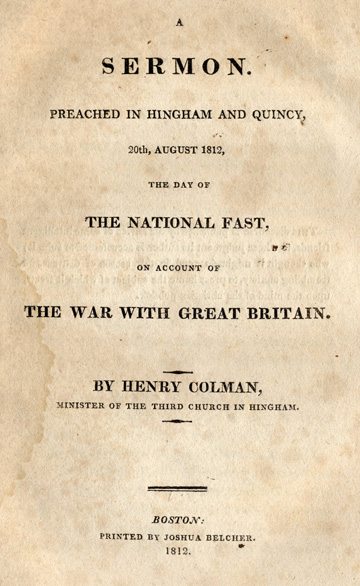
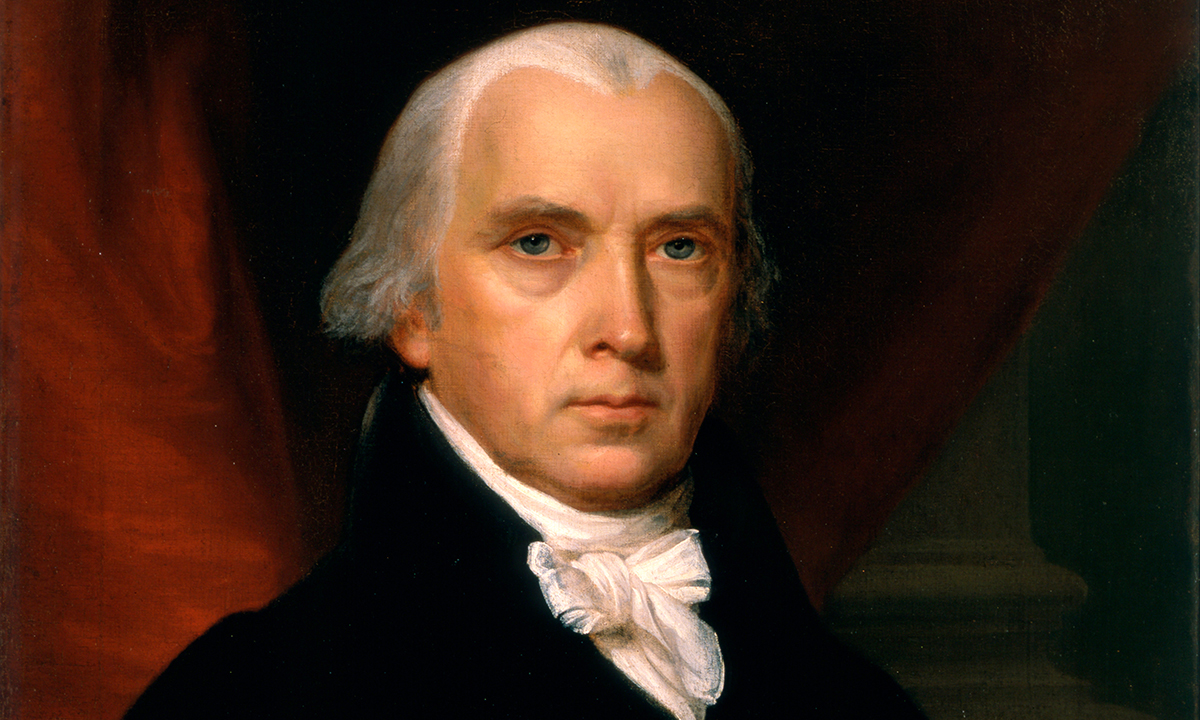

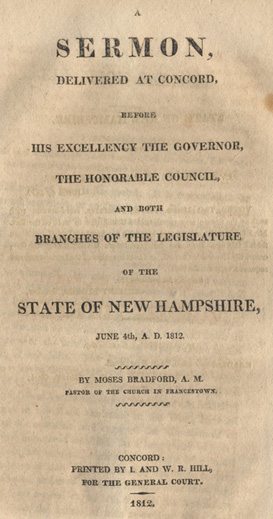
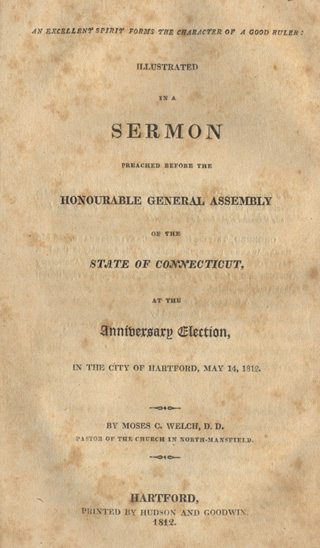

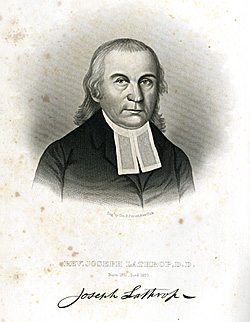 (1731-1820) Biography:
(1731-1820) Biography: